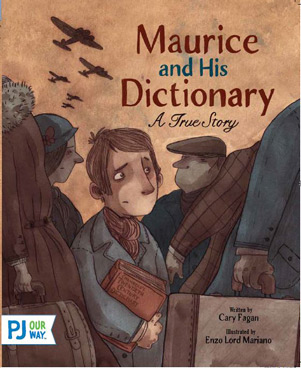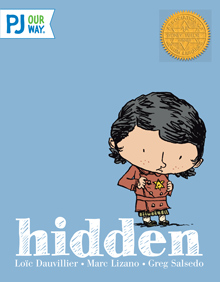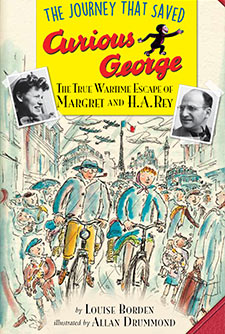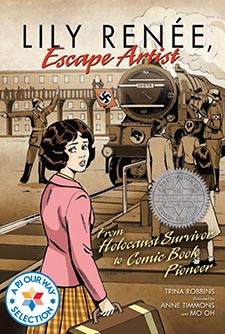Maurice and His Dictionary
Maurice always dreamed of studying law, but now he’s stuck in a Jamaican refugee camp, far away from home!
Check out this fascinating (and true!) graphic novel about Cary Fagan’s dad and his experience during the Holocaust.
Check out this fascinating (and true!) graphic novel about Cary Fagan’s dad and his experience during the Holocaust.
Average Rating
( hint: Login to leave a review! )
106 Reviews
Leave Review
What the Book Is About
Jewish Content & Values
Positive Role Models
Content Advisory
Talk It Over
More for You
What the Book Is About
Fourteen-year-old Maurice dreams of becoming a lawyer, but when the Nazis invade Belgium, his family must flee across several countries, eventually finding safety in a refugee camp in Jamaica. Throughout it all, Maurice’s treasured English dictionary serves as a symbol of his dreams and gives him the determination to get the education he needs, whatever it takes.
Jewish Content & Values
- Maurice and his family travel across several countries to escape the Nazis. The majority of the book focuses on their time in a refugee camp in Jamaica for Jews escaping the Nazis.
- Most of the Jewish content is visual: There are illustrations of Maurice and his father in temple; the family having a Shabbat meal; a menorah on the table; men wearing tallit (prayer shawls) and praying on the ship’s deck; and a klezmer trio on the ship playing accordion, violin, and mandolin.
Positive Role Models
Fourteen-year-old Maurice dreams of becoming a lawyer. He holds onto his dream and works hard at his studies even when his family has to move from Brussels to Paris to the south of France, then Portugal and a refugee camp in Jamaica. He finds ways to educate himself when there is no school for him to go to, and he travels from the refugee camp to persuade the principal of the school to let him enroll. With his precious English dictionary serving as a symbol of his hope for the future, Maurice is determined and resourceful, and never gives up in the face of obstacles.
Content Advisory
The beginning of the book explains that the family knew that the Nazis were taking Jewish possessions, beating and humiliating Jews, and sending them to concentration camps. The father is rounded up and put in a van, but he escapes. No graphic details are given.
Talk It Over
The refugees at the camp are not allowed to make or sell anything or to get paid for working. The father disobeys this rule and makes leather goods to sell because he wants the family to have new clothes. The mother worries they will get caught. Whom do you agree with, and why?
More for You
The Gibraltar camp in Jamaica, where Maurice and his family were refugees, was set up as an evacuation camp for people who lived in the British colonies of Gibraltar and Malta. The British government agreed to house around 800 Jewish refugees too; the American Jewish Joint Distribution Committee paid for their food and clothing. Camp residents could get passes to travel around the island and sometimes take overnight trips. The camp had stores, a hospital, and a police station. There was a room that served as a synagogue, and also a kosher kitchen.
What the Book Is About
What the Book Is About
Fourteen-year-old Maurice dreams of becoming a lawyer, but when the Nazis invade Belgium, his family must flee across several countries, eventually finding safety in a refugee camp in Jamaica. Throughout it all, Maurice’s treasured English dictionary serves as a symbol of his dreams and gives him the determination to get the education he needs, whatever it takes.
Jewish Content & Values
Jewish Content & Values
- Maurice and his family travel across several countries to escape the Nazis. The majority of the book focuses on their time in a refugee camp in Jamaica for Jews escaping the Nazis.
- Most of the Jewish content is visual: There are illustrations of Maurice and his father in temple; the family having a Shabbat meal; a menorah on the table; men wearing tallit (prayer shawls) and praying on the ship’s deck; and a klezmer trio on the ship playing accordion, violin, and mandolin.
Positive Role Models
Positive Role Models
Fourteen-year-old Maurice dreams of becoming a lawyer. He holds onto his dream and works hard at his studies even when his family has to move from Brussels to Paris to the south of France, then Portugal and a refugee camp in Jamaica. He finds ways to educate himself when there is no school for him to go to, and he travels from the refugee camp to persuade the principal of the school to let him enroll. With his precious English dictionary serving as a symbol of his hope for the future, Maurice is determined and resourceful, and never gives up in the face of obstacles.
Content Advisory
Content Advisory
The beginning of the book explains that the family knew that the Nazis were taking Jewish possessions, beating and humiliating Jews, and sending them to concentration camps. The father is rounded up and put in a van, but he escapes. No graphic details are given.
Talk It Over
Talk It Over
The refugees at the camp are not allowed to make or sell anything or to get paid for working. The father disobeys this rule and makes leather goods to sell because he wants the family to have new clothes. The mother worries they will get caught. Whom do you agree with, and why?
More for You
More for You
The Gibraltar camp in Jamaica, where Maurice and his family were refugees, was set up as an evacuation camp for people who lived in the British colonies of Gibraltar and Malta. The British government agreed to house around 800 Jewish refugees too; the American Jewish Joint Distribution Committee paid for their food and clothing. Camp residents could get passes to travel around the island and sometimes take overnight trips. The camp had stores, a hospital, and a police station. There was a room that served as a synagogue, and also a kosher kitchen.




